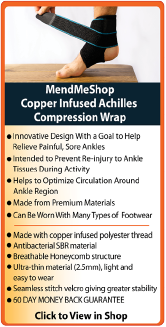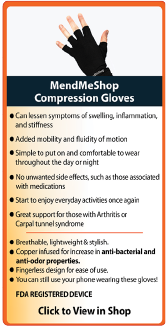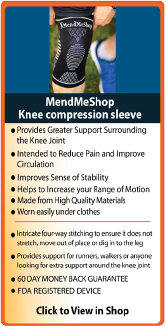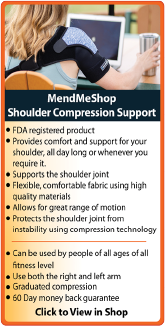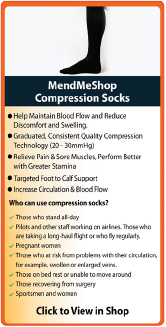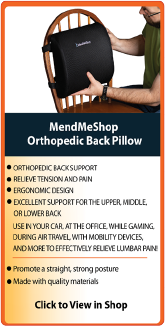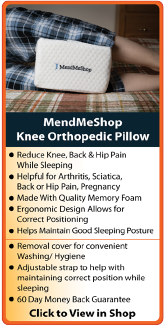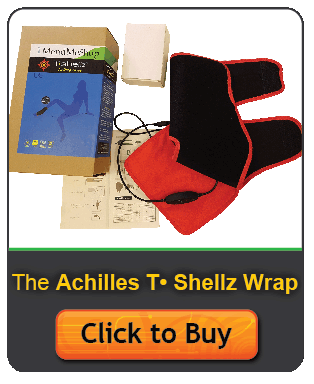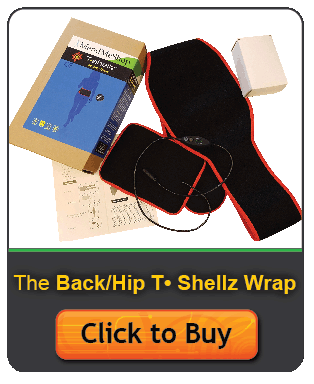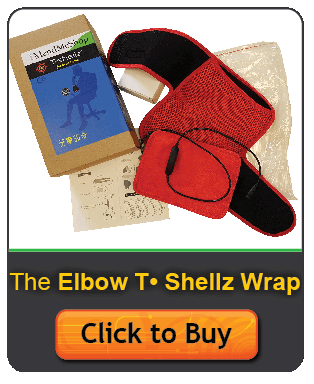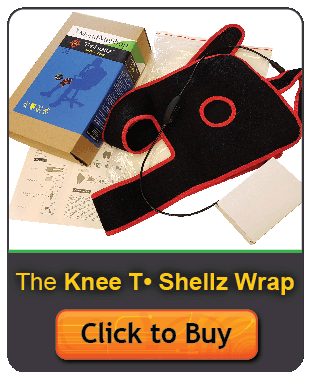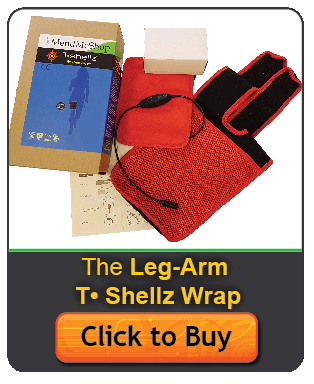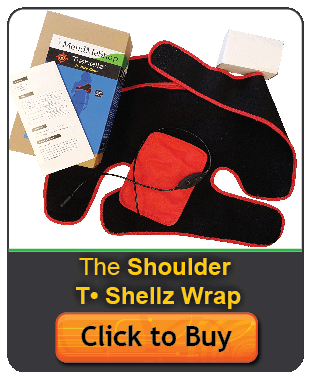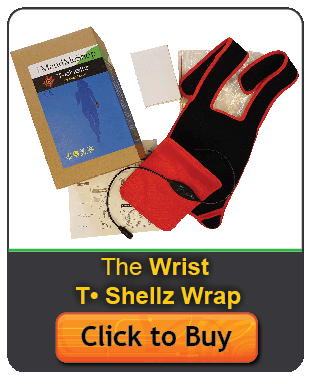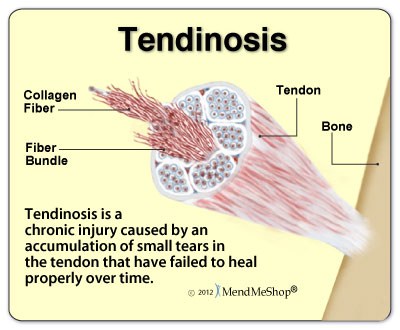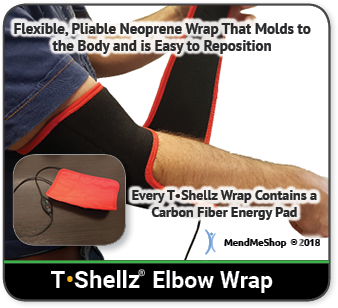|
| Treatments for Tennis ElbowSome conservative treatment methods recommended include:
For acute (new or recent) elbow injuries that have the ability to heal on their own - your doctor may even suggest use of a removable sling. This can be helpful to prepare you for PT sessions and mobility exercises. However, prolonged use of a sling or long-term rest (restricted movement) without proper exercise or stretching can make your elbow condition worse (and also affect shoulder mobility). If your arm remains completely immobilized and at constant rest, the edges of your soft tissue tear will begin to fill in with scar tissue as part of the healing process. You may also have on-going symptoms of pain, swelling, inflammation, and even poor blood flow circulation. In most cases, your Doctor will start with non-surgical treatments options. Some of the options your doctor may recommend include drugs or medications like NSAIDs (non-steroidal anti-inflammatory drugs) to manage pain and inflammation. Steroid injections are advised with caution for any type of tendon condition as there is increased risk of tendon rupture. What About Surgery?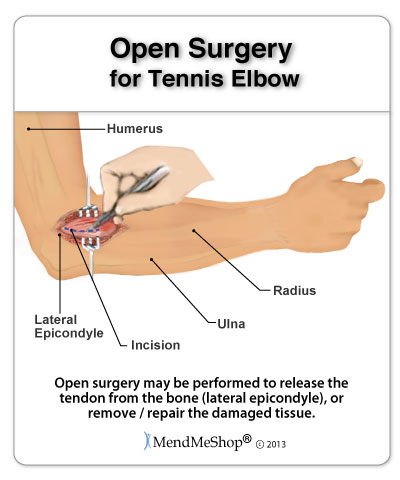 It is true that 5% of all people suffering from Tennis Elbow may need to undergo surgery. The other 90 to 95% of all people will recover from their Tennis Elbow symptoms within 12 months of consistently using conservative treatments. (source: WebMD) Before surgery is even considered, your physician will advise many months commitment to a conservative treatment program at least 6 consecutive months. Why so long? Your doctor will encourage you to stick to your at home treatments, your body has the ability to heal all on its own. In most cases time is needed for the tissue to form and be healthy enough to cope with our busy lifestyles. Surgery is only the last resort for the elbow! This is because the elbow joint is very flexible and the skin is thin. This flexibility stretches the tissue and lack of blood flow makes damage to the tissue very hard to heal. Conservative treatment options (outlined above near the top of this page) will help prepare your elbow for surgery. Strengthening your arm before surgery will give you a better chance for a successful recovery. Surgery is not the end of the journey with your elbow recovery, but another new chapter that has it's own challenges. You may not return your arm to the complete function and range of motion you had before. After surgery, you will undergo another 6-12 months of conservative treatment options to help heal your arm. Learn more about Post-Surgery Rehabilition and Recovery for your Tennis Elbow Surgery Tennis Elbow Supports and ExercisesYour doctor may encourage you to use a tennis elbow cuff or brace. The brace or cuff gently adds compression to the muscles in the forearm to support the tendons in the elbow. Most physicians caution you in not wearing the elbow brace too frequently, as elbow tissue is then not allowed the time to heal. In some cases, prolonged use of a brace may cause increased secondary conditons such as pinched nerves and interruption to the blood flow to the joint. Restoring Your Elbow's Flexibility and Strength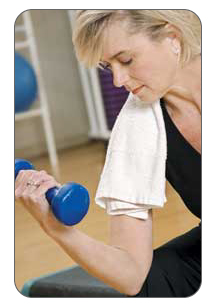 PT is a very helpful way to decrease pain in the soft tissue, restore strength to atrophied muscles and improve elbow, forearm and wrist strength and mobility. Your physical therapist will start you on a program will be tailored for your tennis elbow injury. Once your pain starts to reduce, a physical therapist (PT) will also set up an individualized arm and shoulder strengthening and stretching exercise program for you to perform at home or in the gym. This will be based on your needs and abilities, and will help you return to performing your normal routines. A trained physical therapist will help to ensure your rehabilitation process is effective. For best, long term results use the TShellz Wrap® before undergoing PT to gain residual elongation and extensibility of collagen tissue. (reference: Chapter 9 of "Therapeutic Heat and Cold", 4th edition [amazon.com link] Ed. Justus F. Lehmann, M.D., Williams, and Wilkin) 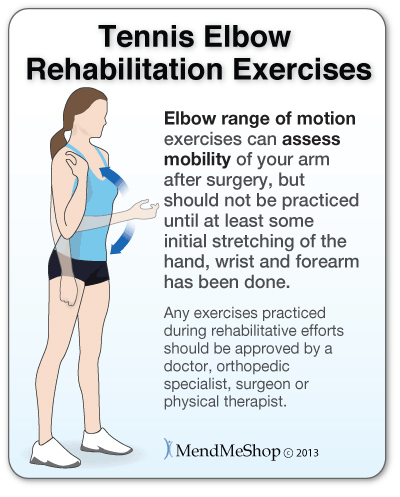 As you start to return to your activities, it is good to gauge how well you are using your arm in these activities to determine if you can decrease stress on the injured tissue. This may involve changing your technique for sports, for example using a two-handed backhand instead of a one-handed backhand in tennis, or using a properly weighted racquet (which will take stress off your forearm muscles). You may also need to change equipment you use at your job or at home to help you perform tasks more effectively and safely. You may opt to start taking a taxi temporarily. More frequent short breaks (and even stretches) at work are usually very helpful, as this allows your body a chance to relax and take some strain off your stressed soft tissue. It is important to speak with a medical professional or occupational therapist to get more information about proper equipment, procedures and tools necessary for the specific activity you participate in or the office/work setting you work in during your normal daily life. Lifelong HealthThe best way to manage the health of your body is to understand the tools for a healthy lifestyle. Using proven conservative treatments, alternative treatments, protection, and self-management (diet, rest, exercise), you can proactively manage your own recovery. Your lifelong health depends on your commitment to living a healthy and safe lifestyle.  You may have to modify some of your activities or movements during your recovery to ensure the long term health of your elbow. Even if you are already feeling less pain and greater mobility, you need to continue with your treatment plan. Until your elbow is healed, you are still at risk for further damage. Keep in mind, the longer you wait to treat your Tennis Elbow injury, the greater the potential for re-injury or for permanent damage to occur. Most often, Tennis Elbow injuries are developed after ignoring your body's warning signs. Masking pain and immobility or continuing strenuous repetitive movements cause micro tears to form in your tendons. If your body is not given a chance to heal, scar tissue will form. This weak, inflexible tissue will cause chronic Tennis Elbow symptoms that include constant pain and functional restriction. Most cases of Tennis Elbow are completely treatable by conservative treatments. If you want to continue to enjoy your activities, sports, or have a physically demanding job, committing yourself to a conservative treatment routine, as soon as possible, will increase your chances of a full recovery. The more committed you are to your recovery, the faster you can return to your active lifestyle free from pain and immobility.Non-surgical Tennis Elbow TreatmentsYour initial treatment should involve decreasing any swelling, relieving any pain and stress on the elbow, correcting any bio-mechanical dysfunction, and then restoring strength and mobility to your injured elbow. It's also very important to follow any instructions you receive from your physician. Allowing your elbow to rest is recommended following injury, however, some careful arm movement is required to prevent the joint from freezing and losing range of motion. See your doctor or physical therapist for stretches that will not cause further injury to your elbow. Avoid activities that may have caused the injury or irritation and begin cold compression treatments as soon as possible. The trick to healing your injury and getting your elbow back in the best possible condition you can is to get it to heal with minimal scar tissue - which is why we recommend Elbow TShellz Wrap® treatments once the swelling is down. Even with optimum healing, there is always less elasticity in previously injured tendons, muscles and ligaments. However, if you heal your tissue properly and keep it flexible and supple during your recovery, your chance of re-injury or chronic elbow conditions later on is much lower than average. The less re-injury that occurs during your recovery, (1) the less scar tissue you will have to contend with, and (2) the faster your recovery will be. Although steroid injections may provide temporary relief from the pain of tennis elbow, tendinitis, bursitis, and other injuries they should generally be avoided as they weaken the tendon and may lead to a rupture. If you do opt for an injection, doctors usually recommend that you do not participate in strenuous activities for several weeks to reduce the risk of a rupture. Conservative Treatment Step 1: Reduce The Initial InflammationInflammation is the body's natural response to an immediate soft tissue (muscle, tendon, ligament, bursa) injury and is a normal part of the healing process - helping to reduce tissue infection in the early stages of injury. Swelling, pain, heat sensation, redness, and loss of function are the main symptoms experienced. The combination of rest, topical pain relief cream and minor amounts of cold is the gold standard in medicine for minimizing tissue damage and reducing inflammation after injury or activity. It serves as a critical bridge into the next phase of the healing process. Conservative Treatment Step 2: Enhance Blood Flow to the Injured Soft TissueTendons,ligaments, cartilage, and some muscle fibres are dense tissues. As a result, they naturally receive limited blood flow and this is precisely why injuries to these tissues take so long to heal. The challenge is, how do you effectively increase blood flow to these tissues?
 It is through the blood the body carries the nutrients and oxygen that injured tissues rely on for recovery.. It is well known that increased blood flow helps your body accelerate the healing process. This is why the TShellz Wrap® is such an important tool. The whole purpose of the wrap is to accelerate blood flow to soft tissue in the treatment area. The end result; you relax the blood vessels within soft tissues of the treatment area. The vessels will naturally expand and allow for more blood flow to reach the very tissues you are trying to heal. In addition, this process will help clear the area of toxins and excess fluid build up, thereby reducing inflammation. Conservative Treatment Step 3: Recognize That Healing is a ProcessWith dedication, the right tools, and the right information - you will achieve your goal of a sustainable recovery. A combination approach of rest, cold, heat, enhanced blood flow, and functional movements will make it happen much more quickly. Healing takes a comprehensive approach and will differ from person to person. Surgical TreatmentWhen Conservative Treatments FailAbout 85% of people with tennis elbow or golfer's elbow experience pain relief within 12 months of starting their preliminary treatments. A tennis elbow or golfer's elbow injury will usually heal without surgery. However if you continue to suffer from persistent pain, weakness or recurring inflammation after trying the above conservative treatments, you may require a surgical option. Although rare overall, this is more common in tennis elbow than golfer's elbow. The type of surgery you require will depend on the size, shape and location of your injury. This will be completed through day surgery; however it will require extensive rehabilitation utilizing the preliminary treatments noted above. PT and strengthening normally begin about 6 weeks after surgery. Your surgeon should provide a treatment plan to help you regain normal use as soon as possible. Speak with your doctor about incorporating the Elbow TShellz Wrap® in your home conservative treatment protocol during your post-surgery recovery period but not for at least 6 weeks after surgery... generally once you are given the ok to start stretching at home.. Elbow ArthroscopyElbow Arthroscopy involves making a small incision on the outside of your elbow and inserting a pencil-thin, fiber optic camera with a small lens and lighting system. 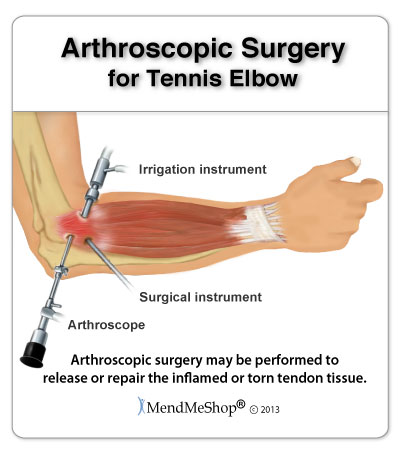 The surgeon will take a look inside your joint to investigate all the soft tissues and bones. These images will then be transmitted to a TV monitor, which allow the doctor to make a diagnosis and/or perform the repair under video control. Your surgeon may repair tears or remove damaged tissue. They may have to cut the tendon at its attachment to the epicondyle bone and remove a small portion of the bone to increase blood flow to the area. Afterwards, sutures (stitches and/or anchors that hold the tissue together after they have been severed) can be used to attach the tendon to the bone. At the end of surgery, your incisions are closed, a dressing is applied, and you are placed in a splint. There are always some risks associated with any surgery, which include but are not limited to possible infection, allergic reaction to medications, and damage to surrounding nerves or blood vessels. However, modern techniques have significantly minimized the occurrence of these problems. Tenderness, pain, stiffness and weakness are very common after surgery, but with proper rehabilitation these should diminish. Although surgery is often successful at repairing any damage and/or relieving pain, it does not necessarily return strength to your elbow or forearm. That is why a strong commitment to rehabilitation is essential. Healing and recovery time is generally dependent on the extent of your injury, your age, pre-injury level of function, and your commitment to rehabilitation. Know that if conservative treatments are the right option for you, then consider dealing with your injury seriously by incorporating the use of an Elbow TShellz Wrap®. Self-ManagementIn order to live a healthy lifestyle, it is important to manage your weight, diet, and level of exercise. Self-management of your health will result in lifelong benefits. Information Seeking and being Proactive are key tools to understanding and maintaining your body. It is important to keep a positive attitude and to always seek the guidance of your physician if you have any questions or concerns about your health. The best way to manage your health is through:Weight Loss/Weight Maintenance Being overweight or underweight, places unnecessary stress on your body. These stresses can reduce your energy levels and put you at risk of developing injuries, life altering conditions, or disease. Maintaining a healthy body weight will increase your energy, your self confidence, and your ability to complete activities. A healthy weight can be achieved through exercise and a diet rich in vitamins and minerals, antioxidants and phytochemicals, protein, fats, and complex carbohydrates. Speak to a registered nutritionist about developing a healthy eating plan catered to your individual lifestyle and favorite foods. Exercise and Activity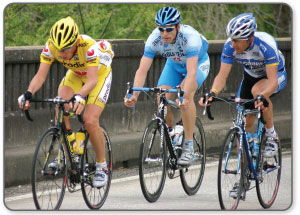 Keeping a regular routine of exercise and activity will not only promote weight loss/weight maintenance, but will also make you feel good! Exercise releases chemicals in your brain called endorphins. These chemicals affect your mood and leave you feeling energized, happy, and self-confident. Exercise has been proven to help deal with the effects of depression and other mood disorders. Exercise will strengthen your body to prevent injury and allow you to accomplish all of your physical goals - whether those goals are for athletic activity or being able to lead a normal, active, healthy life. Understanding your Tennis Elbow InjuryThe best way to tackle a problem is to face it head on. To do this, you have to understand what you're up against. It is important to know how you sustained your injury and the effects it is having on your body. This will allow you to take the steps you need to treat your symptoms and prevent further injury. Sometimes this involves modifying or limiting the way you participate in activities. Dealing With Negative Emotions and Planning for Success It is important to keep a positive attitude, but sometimes that can be difficult. Focus on your goals and create a realistic plan on how to achieve them. Speak to your physician to fully understand your recovery process. Talk to other people who are experiencing Tennis Elbow symptoms like you. Look at all of the things you can/have accomplished and reward yourself for achieving your goals. Remind yourself that you are in control of your recovery and the commitment to your treatment will help you achieve lifelong health. Tennis Elbow Injuries Not Only Affect the Elbow - But Can Lead to Other Conditions and Injuries.Every time we use our injured elbow - damaged and swollen tendons and muscle tissue move; when they are inflamed, every movement hurts. With injured tissue, pain happens - sometimes a LOT of pain, so we try not to move it. So, when doing something we need to use our elbow for (getting dressed, driving, talking on the phone), we start to use the shoulder and wrist more. If we can, we use our other elbow instead even though it is inconvenient. A couple days later (after purposefully avoiding movement of our elbow), the pain has gone down (as well as the swelling) and this is where the trouble begins! The pain disappeared with the swelling but we still aren't fully healed! Not knowing this, we start using our elbow normally again and then the injury swells up again like it did before - all because the injury wasn't fully healed in the first place. We continually re-injure our tennis elbow through our daily activities and now this injury has become chronic, continuing to worsen week after week. Eventually, we use the other elbow more and more. This is why the elbow and opposite shoulder start to hurt - they are being overused now. Soon, aches and pain can become commonplace in the upper body - all as a result of the orignal elbow injury and the body's instinctive nature to "protect" it - all because the injury wasn't fully healed in the first place! We continually re-injure our elbow through our daily activities and now this injury has become chronic. Muscle imbalances result, placing tension on bone and softer tissues - leading to a misalignment within the upper body. The extra stress on the opposite side of the body will also result in weakness and fatigue of the tissues - increasing the chances they can eventually be injured or gradually degenerate. This is a textbook example of how you get an overcompensation injury. In some cases, physical therapists warn that overcompensation can be very dangerous as it will affect gait or alignment on a permanent basis. An injury to one elbow can easily lead to straining in other areas, making an overall recovery hard to initiate. For example, a serious muscle strain in the right elbow can often lead to over-straining of the left elbow. Most commonly, the injury occurs on the dominant side, so the risk of straining the other (weaker) side increases. The longer the injury (and corresponding pain) persists, the greater the chance that you will sustain more strain from overcompensation, eventually leading to issues in those areas as well. To minimize potential secondary injuries, know that it is important to deal with your tendon/muscle injury quickly and completely. Truly, elbow injuries can become a vicious cycle - which is why it is absolutely critical to focus on methods that improve and strengthen the injured tissues in a timely manner. The faster you truly heal, the less chance you have of sinking into a downward spiral of re-injury, scar tissue growth and overcompensation injuries. Okay, So I Have an Elbow Tendinosis Injury...What Should I Do Now?Stage 1: If the elbow injury is very recent - use a good quality cold pack and Arnica Pain Relief Cream.Note: If you are suffering from a tendinosis injury that has been going on for awhile, then skip the cold treatment as inflammation will be minimal. Anytime you are experiencing significant pain, you may find our Arnica Infusion Pain Relief Cream to be quite helpful. 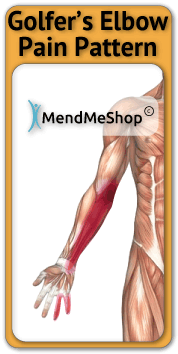 If you are experiencing pain and swelling in the very early stages of the injury (first 48 to 72 hours), the first step in a conservative treatment protocol would be to focus on reducing the discomfort by applying a quality cold pack to the injured elbow/forearm along with a high quality pain relief cream such as our Arnica Infusion Cream. Not only will you use your cold pack for the first 48 to 72 hours after the injury, but you should also use it during other stages of the healing process. Some examples include...
Having a Cold Compress or Ice Pack available at home to use if and when the need arises is helpful. Many of you already do so. However, many people over-focus on cold while ignoring the most critical aspect to healing - nourishing injured tissue with a strong blood flow - the body's healing capability is generally dependent on blood flow.. This leads to the most important recommendation... Stage 2: Focus on Increasing Blood Flow To The Injured Tissue - As This is How Soft Tissue Heals For the Long-TermEven though the concept is simple, improving blood flow to injured tissues can be difficult. When the injury is elbow related, the challenges are even greater. Traditional methods require your muscle to move to promote blood flow (exercise), but that same motion that promotes blood flow can at times lead to making your pain and condition worse.
Most people we deal with tell us these scenarios have happened to them many times in the past. Perhaps it has already happened to you. Promoting blood flow within a muscle or soft tissue injury to help the body heal itself is a concept that has been utilized for centuries. This is where the focus has to be if you are seeking long-term improvement. Oxygen and nutrients, carried within the blood, are critical for the body to heal itself. Without proper blood flow, recovering from an injury or condition will be delayed...sometimes for a very long period of time. The real challenge is how do you promote blood flow to the elbow injury site without causing further injury? This goal is further complicated by the fact the elbow (and muscles controlling the elbow joint) are involved in the majority of the physical movements we perform each day. 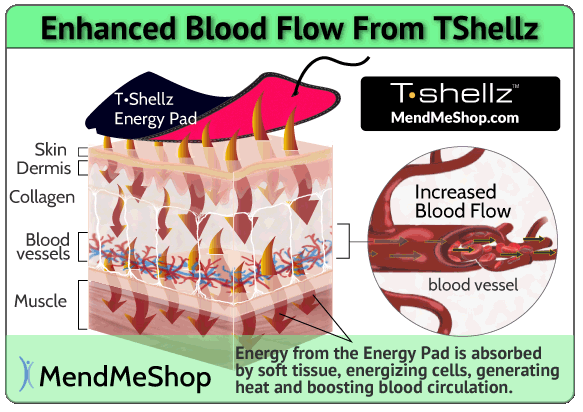 An injury that often leads to straining in other areas will make an overall recovery hard to initiate. People tend to "chase the pain", meaning they only focus on treating an area that is actively painful, while not taking into account the fact that other areas of the body will be overcompensating...eventually leading to issues in those areas as well. Heat increases blood flow in soft tissue in the treatment area. This means ligaments, muscles, and tendons. Increased blood flow, combined with heat results in relaxation of the vessel walls. The vessels then gently expand, allowing for more nutrient rich blood flow along with extra oxygen to reach the damaged tissues. Plus, the enhanced blood flow helps in flushing waste and fluid build-up from the injury site - further enhancing the ability of the body to heal. Now, on to recommendation number two in the journey to heal your injured elbow... The Elbow TShellz Wrap® - A Healthy Elbow For The Long TermThe best option we came across in our research to accomplish effective blood flow to soft tissue in the treatment area at home is the TShellz Wrap®. With a TShellz Wrap® application, more blood begins to flow effectively to soft tissue within the body - for the length of the treatment and a short duration thereafter. Soft tissue needs the extra blood flow to heal as it is through the blood the body carries the oxygen and nutrients needed for proper and long-term healing. Have you seen what happens when you add water to a flower wilted from drought? In essence, your injured elbow is much like a "wilted" flower; your body wants to heal its injury, but needs lots of nutrients to do it. Blood brings life to your tissue by delivering healing nutrients and oxygen that are vital for their growth and survival. In addition, the blood carries away toxins and waste cleaning the area and healing it faster. Without a good supply of blood, your elbow simply won't heal properly. Using a TShellz Wrap® will not expose you to the risk of causing further harm to soft tissue like you can when using rigorous exercise. The Elbow TShellz Wrap® accomplishes the goal of enhanced blood flow without the need for intensive exercise and as such reduces your risk of re-injury. Who Should Use the TShellz Wrap®We recommend the use of a TShellz Wrap®:
Increased Blood Circulation = Increased Healing CapabilityTShellz Wraps® contain a unique Carbon Fiber Energy Pad which is flexible and will shape to conform to your body. This Energy Pad emits a uniform wave of perfectly safe energy over its entire surface. This energy is absorbed by soft tissue in the treatment area, opening blood vessels, resulting in an increase in blood flow. Increased blood circulation is what your body needs to accelerate the healing of soft tissue and this is why we recommend the Elbow TShellz Wrap®. Best of all... The Elbow TShellz Wrap® is an FDA Registered Medical Device and is suitable for use in therapeutic clinics and FROM HOME. It is completely safe for people and patients to use for themselves. <The technology found in a TShellz Wrap® has been used for decades in the worlds of professional and amateur sports - a contributing factor as to why athletes seem to recover from injuries so quickly. Have you ever wondered by an athlete can return to activity after 3 or 4 weeks following a severe elbow injury - while your average person takes much longer to return back to normal? The secret isn't really that much of a secret - it involves consistent treatments (meaning multiple times a day) using a treatment like the TShellz Wrap® to stimulate blood flow to the injured tissues. Most athletes have the luxury of using in-house facilities many times per day. How many us can afford the time and money to visit a clinic multiple times a day? Very few indeed. This is how you can gain the same advantage that athletes enjoy in their injury recovery - by using a device like the Elbow TShellz Wrap® two or three times a day on a consistent basis. Consistent Treatments = Consistent And Long Term ImprovementWhat Else Makes the Elbow TShellz Wrap® So Special?We believe the TShellz Wrap® to be one of the most effective home treatments to increase localized blood flow to soft tissue in and around the treatment area. We can promise that you will receive a product that is designed to be safe and does what it is supposed to do...quickly relieve pain and aid in the recovery from tendon, muscle and other soft tissue injuries. The unit plugs into a standard wall outlet to get its power. The nice thing about the power supply is that the same unit can be used in North America and overseas as well. It has the capability to operate between 110v and 230v. The TShellz Wrap® has a special signal controller that can be set for 3 different power levels of application (3=High, 2=Medium, 1=Low). The cord is long enough that you can sit or lie comfortably and watch TV, read or surf the net while you're using it. Treatments are max 30 minutes in duration and the device can be worn over clothing. This allows you to use the device at work, at home, or really anywhere you have access to an electrical outlet. A Recap of the Benefits of the Arm/Leg TShellz Wrap®..
When Should I Use My TShellz Wrap During the Day?The most common question we receive from individuals prior to purchasing is - how many times a day should I be using my elbow wraps and when should I be using them? While treatment plans will differ for each individual and their specific injury, there are general guidelines that should be adhered to.
The Elbow TShellz Wrap® would then be used:
A Note On OverCompensationSince you are reading this, you probably know that serious elbow tendinosis injuries do not just disappear. Over time, they usually wreak havoc on your shoulder & wrist due to lack of movement and over-compensation. It will also wreak havoc on your opposite elbow due to overcompensation. Recovery takes a longer time for such chronic (long term) injuries, but proper healing is essential to regain strength and get you back to the activities you enjoy. The longer your injury endures, the greater the risk of running into serious overcompensation injuries. To Stop Re-Injury & Reduce the Risk of a More Serious Overcompensation Injury, You Need to Heal Quickly & Completely!Anyone in need of rapid recovery and complete healing must consider a comprehensive treatment plan that includes an effective means to minimize swelling and inflammation yet also stimulate healing and tissue elasticity. We have found no better set of tools that can be used at home than this: Conservative Treatment Tools Our Clients Have Used to Help |
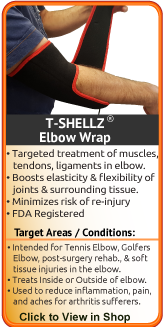 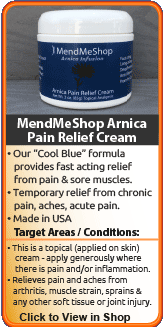 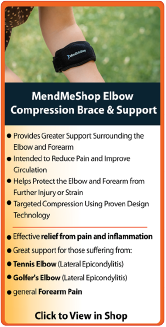 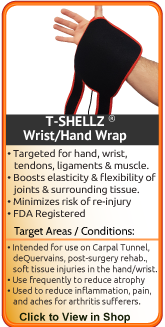 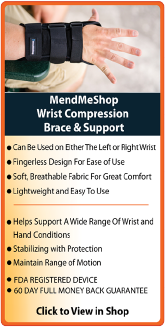 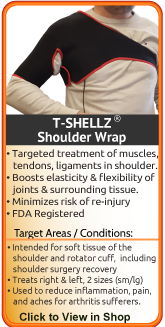 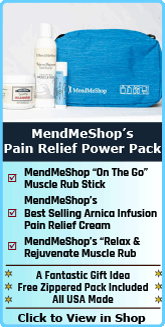 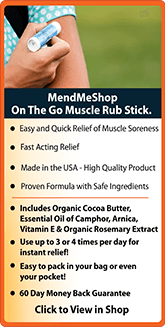 |
